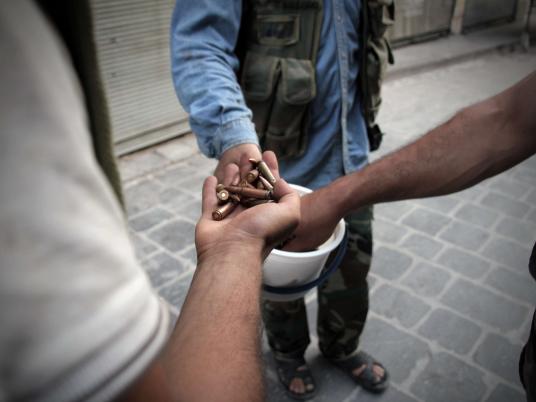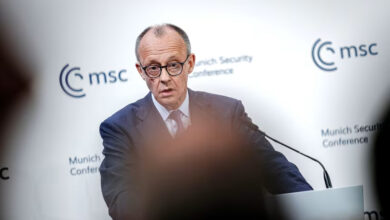
Yasser al-Najjar is a member of the Syrian National Council, and also part of the Free Syrian Army. When he is not in Syria coordinating between different battalions, he is a nomad between Egypt, Turkey and Qatar, raising support for the Syrian revolution. Before, he used to work as an engineer, and was also the founding member of the NGOs Union in Damascus. After meeting him briefly in the battlefield in Aleppo, Egypt Independent sat with him on his short visit to Cairo.
Egypt Independent: There is a lot of talks about the lack of coordination among the FSA brigades. Is this a legitimate concern?
Yasser Najjar: There are two levels of organization we need to consider: the front line and the back line. On the front line, the FSA is very well-coordinated.
For example, the current battle in Aleppo is clearly divided into several positions, and each brigade is in charge of particular parts. If conflicts erupt between the different brigades, they are minor, like the fighting that erupts among family members. Feuds erupt because of the scarcity of resources, and particularly weapons.
But fighters on the front line are learning through the process and benefiting a lot from defectors. They will soon become a strong nucleus for an organizational army.
The less organization is in the back lines of the FSA brigades, where you find less coordination between both big and small brigades.
These are usually the people who will go back to their normal lives after the fighting. They are just protecting themselves now, and joining the FSA is a legitimate way to survive during the war, since it’s the only body receiving support. But they won’t be part of an army.
EI: What is the current condition of support for the FSA?
Najjar: The FSA is getting most support now from all funding organizations. There is an understanding that Syria needs more arms than food. But the funding differs from place to place.
In Aleppo, there was never a strong army presence, which is a reflection of the regime’s military establishment and its sectarianism and marginalization of certain areas. There are hence less defections and less support to the FSA in general there.
But official funders have their own agendas. The brigades are organized geographically and not based on qualifications. They are getting help through their network of connections.
So if it is a brigade in a rural or poor area, they might not have strong connections. There is no central management of the funding, so everyone can work under the table, and this is creating a lot of cynicism especially between Syrians inside and outside of Syria. Institutionally speaking, we can’t tolerate this on the long run.
EI: What are your fears about this divided support?
Najjar: When an ambassador of a Western country meets with a brigade, this is very dangerous. This is espionage. This is politicizing the military process and dividing the divided. They [funders] are turning Syria into a Sykes-Picot [Agreement].
Israel, for one, is attempting a division of Syria like Lebanon. They want to see small countries around them and stop worrying about being the small country in the region. If there is discord between different regimes, at least some will call for help from Israel.
The other option is to elongate the war in Syria to tire the country out. This agenda is detrimental to the whole region.
EI: There is also the concern about some Islamist brigades and their transnational ties.
Najjar: Some groups, like the Nusra Brigade, are making use of Al-Qaeda’s name as a media tactic. But there is no proven organizational tie, and Al-Qaeda didn’t recognize them. But this group, for example, doesn’t seek arms from abroad. Only when they come, they use them.
They are extremely organized, and their commanders know very well how to manage the soldiers and monitor them closely. This is also a trait throughout different Islamist brigades, like the Fajr Brigade, Ahram al-Sham and others.
We were a bit reserved to their suicidal attitude, but they have the doctrine of death. They gave symbols of heroism by immortalizing their martyrs. They can face a whole tank with a gun.
In the battle of Hanano (Aleppo), for example, 253 fighters took part from different brigades. Only 30 belonged to the Nusra Brigade. But it was agreed that all gains out of the battle should go to Nusra, because they were the most organized, and their presence was critical to the victory.
EI: Is the media exaggerating the narrative of Syria becoming a landscape for transnational jihad?
Najjar: When Arab governments fail to support an Arab nation, it’s only normal for people to come and stand with Syrian fighters. Non-Syrian fighters do not amount for more than 15 percent of the FSA. They are all known to us.
EI: Many talk about the need for a quality difference in military support to the revolutionaries as a foreseeable way out of the current stalemate. Do you share those thoughts?
Najjar: There is a theoretical demand, and that is that states supporting Syria unify their efforts and strategy, because we do feel the effect of their divisions inside. There are a lot of contradictions between the Saudis, the Qataris and the Turks. But this is a far-fetched demand.
The practical demand would be that politicians meet their promises for Syria. Syria needs more serious arming. The brigades have been depending on local resources, and that’s not enough. If we get anti-aircraft missiles, that would be enough to put an end to the airstrikes.
EI: Would a no-fly zone be an acceptable type of international intervention?
Najjar: A no-fly zone can happen without intervention, but there is no political will. If NATO stations its missiles on the border with Turkey, it can protect 30 to 40 kilometers southward.
And that won’t be an intervention. We can protect our sky, like we are able to protect our land.
EI: The Syrian National Council is not always referred to with enthusiasm inside Syria, particularly among FSA fighters. Is it a serious divide?
Najjar: The SNC is strong politically, has a medium role on the humanitarian assistance level, and is weak militarily.
Inside Syria, people need humanitarian assistance and military support. That’s what matters, and the SNC needs to develop in these areas.
For now, it is the FSA that has the upper hand. We have been invited to Qatar to look into restructuring the council. This is an important crossroads for the SNC. If the SNC doesn’t take a decision vis-a-vis the restructuring process, its recognition will be affected even by its own members.




